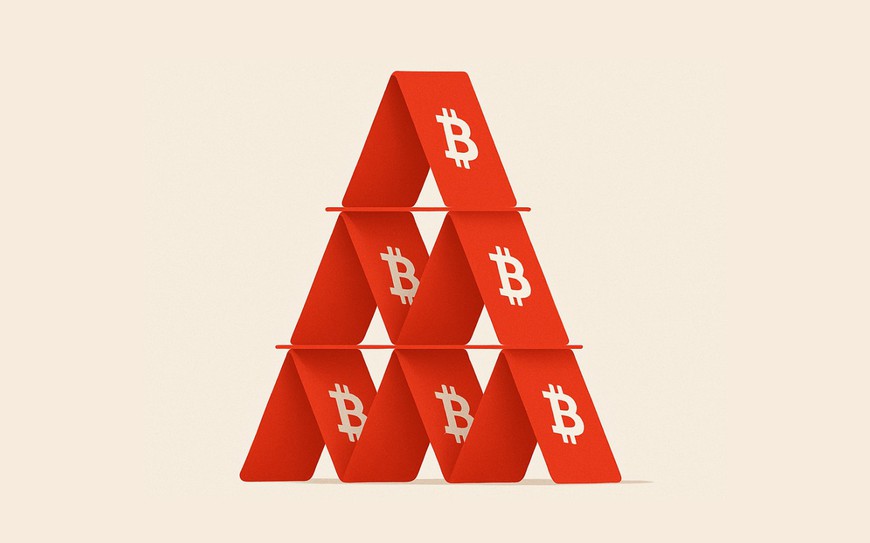

The landscape of online poker media has quietly collapsed. In the last year alone, three cornerstone poker websites have been sold to crypto marketing companies that now use these trusted domains to promote unregulated offshore gambling.
The new owners employ a simple yet effective strategy: they acquire established domains with strong search authority, then redirect that traffic toward crypto gambling sites that operate outside regulatory frameworks. Overnight, sites that once championed regulated poker become vehicles for promoting “no KYC crypto casinos” and “non-GAMSTOP casinos“—explicitly targeting vulnerable players seeking to circumvent gambling protections.
This transformation leaves a critical void in poker media. Today, there are almost no sites left that still advocate for legal, regulated online poker.
Crypto Gambling is Taking Over
Earlier this week, our sister publication Poker Industry PRO published an in-depth investigation into how one company had quietly bought up three legacy poker websites over the last year to promote crypto gambling.
It was something of an open secret that a marketing outfit had purchased PokerScout.com a year ago. Previously owned by a public large US regulated affiliate company, Catena Media, the site switched from promoting legal, regulated US poker sites to pushing offshore crypto sites overnight. It later added pages to promoting “no KYC crypto casinos” and similar.
But this was just the tip of the iceberg. As detailed in the PRO piece, the same company also bought CardPlayer.com in late 2024, and PokerStrategy.com in January 2025. PokerStrategy.com was sold by Playtech for $6.1 million.
These three sites were once cornerstones of poker media. Back in the day, pre-Catena, Pokerscout.com was a highly influential site for poker players seeking to understand the online poker landscape (their daily news aggregation feed was also one of the best sources for sharing headlines). CardPlayer.com was the online presence of the influential print magazine of almost four decades’ standing. And PokerStrategy was once the largest community of online poker players in the world and by far the most influential poker affiliate.
The new owner of these three sites has a simple business plan. It buys up these domains, and promotes crypto online casinos and poker. They promote Coin Poker as their top poker site, regardless of jurisdiction. Their myriad online casino partners are all regulated in Anjouan (can you find that on a map?). They are all owned by a small handful of companies; it is likely that one enterprise is behind every part of this business — from domain acquisition, to SEO marketing, to the actual operation of the casinos themselves.
The domains they buy might be about online poker, online casino or esports. They might be old tech sites or bitcoin news sites. They might be completely unrelated legacy media sites, even lapsed sites for schools. It doesn’t matter. They add a set of landing pages targeting terms like “no KYC casinos,” “offshore casinos,” “fastest paying casinos” and “non GAMSTOP casinos” (GAMSTOP is the UK’s self-exclusion system. All licensed casinos in the UK must implement GAMSTOP).
This is called a parasite SEO strategy. Google sees a domain that has years’ worth of authority, trust and traffic and rightly ranks it highly. It can’t know the site has changed hands. But it sees new pages up about crypto gambling, and dutifully (and rather gullibly) assumes these must also be valuable, authentic pieces of content, so puts them at the top of search results. To keep up the pretense, these sites often continue their “real” news and content production, though often thin, plagiarized content produced very cheaply. The real business lies behind the front page.
Google tries to crack down on this practice, but it’s a game of whack-a-mole: As one domain gets deindexed, another gets bought up. A search today for “non-GAMSTOP casinos” turns out top results from RochdaleOnline.co.uk, gdalabel.co.uk, eSports Insider, and Abercorn School. These are all owned by the same company, pushing the same crypto casinos.
There’s Almost No One Left to Promote Regulated Online Poker
This article is not about the business of parasite SEO. For that, you can read the original PRO article and the Recluedo.com blog (which first uncovered the enterprise orchestrating the entire operation — there is one article specifically about the CardPlayer.com purchase). It is a topic that expands well beyond gambling.
This article is also not going to be about the ethics or legality of promoting these sites — though it is worth a brief pause to consider what it means to target “non-GAMSTOP” or “no KYC casino” search terms (KYC, or know your customer, is a process of identifying the player to ensure they can afford the amounts they gamble). These are systems put in place to protect those most at risk of gambling addiction. Consider who might be searching for these terms and landing on a page that promotes a crypto site. (CoinPoker.com, along with almost 200 associated URLs, has been removed from Google search results in the UK, deemed unlawful explicitly because they operate without license and outside of GAMSTOP).
Here, I want to reflect on what this means for the state of online poker media — and in particular, the remaining sites that discuss and advocate for the expansion of legal, regulated online poker. Because you can now count them on one hand.
Consider today the value of the domain PokerStrategy.com — a site purchased by Playtech twelve years ago for $50 million as the busiest online poker community in the world. Its value has shrunk by 90%, and it was sold off to a company whose entire business is pushing crypto online casinos through search keywords.
PokerScout.com was once a venerated independent online poker site. But even by 2017, when it was sold off to Catena Media, its value was already just $350,000. Catena couldn’t make it work, so has sold it on to a company that can. If you search for “best nevada online poker sites,” PokerScout will be near the top, telling you its Coin Poker. That’s its value now.
Once a site promotes offshore sites, there’s no going back. To work in the US market, an affiliate needs to be licensed, and they cannot work with offshore sites in tandem. Even outside the US, most legitimate operators don’t want to work with sites that also promote unregulated sites. So sites have to make a choice — work in the white market, or switch to the grey and black. And in the last couple of years, we’ve seen more and more realize that working in the white market is nonviable.
Catena Media has almost entirely ditched online poker as a product to promote. It bought OnlinePokerReport, at its peak the leading site for regulated online poker news, and later shut it down. USPoker.com is now dormant; PokerScout sold. The reality is that the regulated online poker market is so tough that it’s more valuable either promoting an offshore site, or selling it to a company who will.
It has got to the point where there is almost no one that is aligned with promoting the expansion of legal, regulated online poker.
Radio Silence for Our #GrowPAPoker Campaign
The impact of this can be illustrated with our recent efforts to encourage Pennsylvania to join the multi-state internet gaming agreement and allow for shared liquidity. We launched the campaign #GrowPAPoker just over a year ago. The goal was for a media blitz, working with other organizations to get the word out and encourage the Governor to sign a bill to allow for the growth of the regulated game.
What support did this campaign receive? PokerStars helped on social media, they ran a special freeroll, and PokerNews also helped a great deal — they did write-ups, and their ambassador streamed his play on the freeroll (Rep. George Dunbar, MSIGA bill sponsor and key champion of #GrowPAPoker, also played). We got a tweet from GGPoker. We got a couple of mentions in newsletters.
And … that was it. There were no other write-ups in any other publication. Ironically, with plagiarism of our content rampant, the one time we effectively endorsed a copy-paste job and there’s nothing. An easy-lift, positive-message article about a social media campaign and a freeroll? Silence. For the few remaining sites still promoting regulated online poker, most have anachronistic policies of pretending no other sites exist — so mentioning us or the campaign is presumably blackballed. For the rest, the expansion of multi-state online poker was actually counterproductive to their site’s goals: A growing multi-state US regulated poker market reduces the appeal of offshore crypto poker sites.
Thankfully, further support wasn’t needed, because we were blown away by the support that really mattered — from the US online poker community. People tweeted, they emailed, and they wrote letters in large numbers. The campaign was a success. Just over six months after we started the campaign, the Governor sent a letter to the regulator seeking it request entry into MSIGA. It received official invitation soon after. We expect the Governor’s signature imminently, and shared liquidity in PA to launch in weeks.
That’s what a grassroots movement can do. And that’s what’s dying out.
Sites Need to Act Now
The bottom line is that there is almost no one left to champion these sorts of causes. Sites are shutting down. Domains are being sold off to parasite media companies to exploit 20-year domain history to funnel gambling addicts to “No KYC” crypto sites.
What can be done? Two things need to happen, and they need to happen immediately.
The few sites that are left that promote regulated online poker need to support each other. We need to link to each other. Give credit. Support original content. Encourage the growth of the regulated game.
And real money poker companies that operate in regulated markets need to support the remaining media that are still aligned with them. You are up against behemoths buying up vintage poker domains to shovel unregulated alternatives. If you want a site promoting you at the top of a search result for searches like “PA online poker sites,” that takes effort, skill and investment.
To be absolutely clear, this is not an article blaming anyone for selling up. This is not an argument on the morals of licensed vs unlicensed online poker, regulated or unregulated, crypto sites vs real money sites. Sites are businesses. They have to pay staff. They need to make the decisions necessary to survive — or to cash in. There’s still a lot of great poker writers out there, and they might have to write for less scrupulous sites.
This article is trying to shine a spotlight on the state of online poker media, and the direction things are going in.
If we teleport forward a few years, there’s a real chance there will be a dozen states in the US connected together for a large multi-state online poker ecosystem. There is some momentum here; by the end of this year, we should have five or six states connected together. We have new operators like DraftKings and BetRivers breathing life into the space. If we get a couple more states — Illinois and New York being perennial hopefuls — we could see a US regulated market rivaling the largest and most valuable in the world.
But given the current trajectory, there will be no sites left to promote it.
April 13: The article was edited after publication to remove one line that gave examples of the few remaining active US online poker affiliates, as it distracted from the main thesis of the article.

